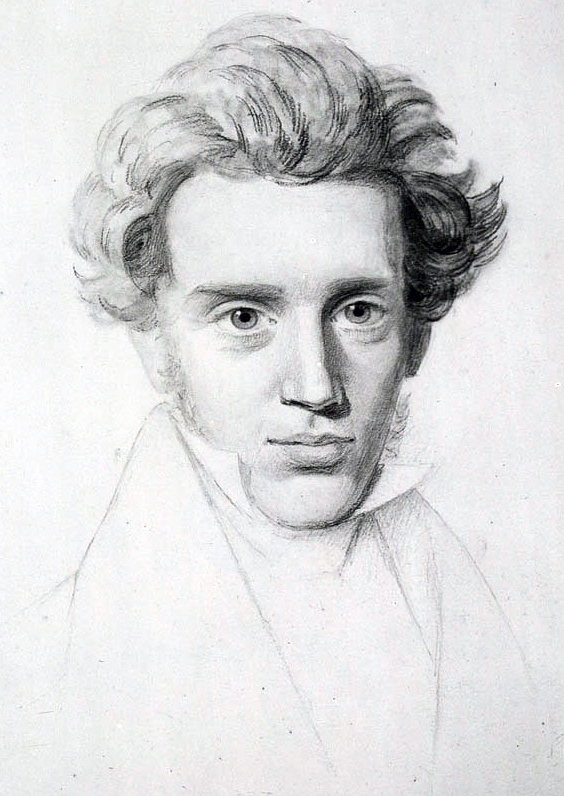Frases célebres de Søren Kierkegaard
Frases de vida de Søren Kierkegaard
“Vivir en el recuerdo es el más perfecto modo de vida que se puede imaginar.”
Fuente: Ortega Blake (2013). En Google Books. https://books.google.cat/books?hl=es&id=QJIAVIKP1dgC&q=Kierkegaard#v=snippet&q=Kierkegaard&f=false Consultado el 23 de diciembre de 2019.
Frases de fe de Søren Kierkegaard
Fear and Trembling
Søren Kierkegaard Frases y Citas
“Dejemos con toda libertad a los sabios el privilegio de no contradecirse nunca.”
/ "Dejemos con toda tranquilidad a la gente sabia el orgullo de no caer nunca en contradicción."
Fuente: Diario de un seductor
Søren Kierkegaard: Frases en inglés
Journals IV A 87 (1843)
1840s, The Journals of Søren Kierkegaard, 1840s
Contexto: It seems to be my destiny to discourse on truth, insofar as I discover it, in such a way that all possible authority is simultaneously demolished. Since I am incompetent and extremely undependable in men's eyes, I speak the truth and thereby place them in the contradiction from which they can be extricated only by appropriating the truth themselves. A man's personality is matured only when he appropriates the truth, whether it is spoken by Balaam's ass or a sniggering wag or an apostle or an angel.
(20 November 1847)
1840s, The Journals of Søren Kierkegaard, 1840s
Contexto: What the age needs is not a genius — it has had geniuses enough, but a martyr, who in order to teach men to obey would himself be obedient unto death. What the age needs is awakening. And therefore someday, not only my writings but my whole life, all the intriguing mystery of the machine will be studied and studied. I never forget how God helps me and it is therefore my last wish that everything may be to his honour.
Concluding Unscientific Postscript, Hong p. 490
1840s, Concluding Unscientific Postscript (1846)
Contexto: Where is the boundary for the single individual in his concrete existence between what is lack of will and what is lack of ability; what is indolence and earthly selfishness and what is the limitation of finitude? For an existing person, when is the period of preparation over, when this question will not arise again in all its initial, troubled severity; when is the time in existence that is indeed a preparation? Let all the dialecticians convene-they will not be able to decide this for a particular individual in concreto.
“Freedom succumbs to dizziness. Further than this, psychology cannot and will not go.”
Fuente: 1840s, The Concept of Anxiety (1844), p. 61
Contexto: Anxiety may be compared with dizziness. He whose eye happens to look down into the yawning abyss becomes dizzy. But what is the reason for this? It is just as much in his own eye as in the abyss, for suppose he had not looked down. Hence, anxiety is the dizziness of freedom, which emerges when the spirit wants to posit the synthesis and freedom looks down into its own possibility, laying hold of finiteness to support itself. Freedom succumbs to dizziness. Further than this, psychology cannot and will not go. In that very moment everything is changed, and freedom, when it again rises, sees that it is guilty. Between these two moments lies the leap, which no science has explained and which no science can explain. He who becomes guilty in anxiety becomes as ambiguously guilty as it is possible to become.
“A line by Thomas à Kempis which perhaps could be used as a motto sometime.”
JP X2A 167
1840s, The Journals of Søren Kierkegaard, 1840s
Contexto: A line by Thomas à Kempis which perhaps could be used as a motto sometime. He says of Paul: Therefore he turned everything over to God, who knows all, and defended himself solely by means of patience and humility.... He did defend himself now and then so that the weak would not be offended by his silence. Book III, chapter 36, para. 2, or in my little edition, p. 131.
“The tyrant dies and his rule is over; the martyr dies and his rule begins.”
1848
1840s, The Journals of Søren Kierkegaard, 1840s
Fuente: The Journals of Kierkegaard
7 July 1838
1830s, The Journals of Søren Kierkegaard, 1830s
Fuente: The Journals of Kierkegaard
“Most men pursue pleasure with such breathless haste that they hurry past it.”
Swenson, 1959, p. 28
1840s, Either/Or (1843)
Either/Or Part I, Swenson Translation p. 19 Variations include: People demand freedom of speech to make up for the freedom of thought, which they avoid. People demand freedom of speech as a compensation for the freedom of thought which they seldom use.
1840s, Either/Or (1843)
1847
1840s, The Journals of Søren Kierkegaard, 1840s
Contexto: It is the duty of the human understanding to understand that there are things which it cannot understand, and what those things are. Human understanding has vulgarly occupied itself with nothing but understanding, but if it would only take the trouble to understand itself at the same time it would simply have to posit the paradox.
